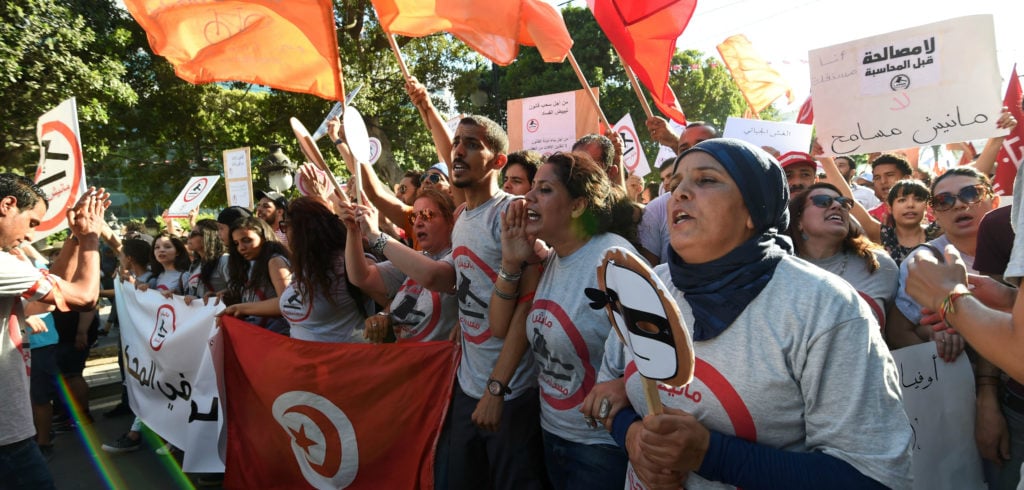
Tunisians protest an economic reconciliation bill proposed by the coalition government in July 2016. Remarkably, democracy has taken hold in Tunisia just 5 years after the Arab Spring, but its success is not assured. (FETHI BELAID/AFP/Getty Images)
Ennahda is the name of a political party in Tunisia formed in the 1980s (whereupon many of its member were jailed or driven into exile by the ruling dictatorship). Throughout its existence Ennahda had been viewed as, and identified itself as, an Islamist party. Its politics have been driven by religion.
Yet in May 2016, Ennahda did something fairly shocking for an Islamist party: it disassociated itself from Islam, or, more specifically, from political Islam. The party formally separated its religious and political activities. Some believe this is most significant example of how Islam and secular politics can co-exist in the Middle East and North Africa. What is more, it may be the solution to achieving something that has eluded the vast majority of the region for so, so long: stability.
Or, as Taylor Luck observes in Christian Science Monitor, “In other words, they have made the transformation that many Western observers think is necessary to bring stable and vibrant democracies to the Middle East…Ennahda aims to establish a new tradition of ‘Muslim Democrats’—voters and politicians guided by their faith but committed to the political system of a pluralistic society.” With this goal, the party would certainly be living up to its name: Ennahda is Arabic for renaissance.
When forced into exile by the ruling autocratic regime, Ennahda leaders sought refuge not with their more conservative Islamic leaders, but rather in Western Europe. In this environment they came to see the advantages of blending their Islamist ideals with the Western tenets of pluralism, democracy, and coalition-building. They grew to believe that Islam and democracy did not have to be mutually exclusive and could even support each other to create a stronger state.
In the meantime, some party officials maintained close ties with trade unions, universities, and other political movements—even those led by rival parties—in Tunisia. Its connection to the political pulse of the country paid off: after dictator Zine el Abedine Ben Ali was ousted in the Arab Spring movement in 2011, Ennahda won 37% of the vote in parliamentary elections. The second-largest party got 9%.
Perhaps even more impressive was what Ennahda did in August 2013. Amid economic troubles and security breakdowns, many Tunisians demanded the party be removed from power. So Prime Minister Ali Laarayadh of Ennahda did what before then was virtually unthinkable by resigning, relinquishing power voluntarily. In the first subsequent election, the party finished in second place but proceeded to do something else previously unheard of by forming a coalition government with the winning party, Nidaa Tunis. More amazing still is that Nidaa Tunis is a secular party. In other words, an at-the-time Islamist party in Ennahda agreed to govern the country in cooperation with a secular one.
But of course, there has been opposition. Some Ennahda loyalists view its shift toward secularism as betraying its Islamist roots. Others believe its recent embrace of democracy does not excuse the damage caused by its revolutionary past.
In September 2016 prominent Tunisian leader Mohamed Moncef Marzouki—president during the country’s nascent post-Arab Spring phase from 2011-14—spoke out very critically against the current government. According to Marzouki, while Tunisia puts forth the appearance of democracy, the reality of the situation is quite different. Marzouki accused officials loyal to current President Beji Caid Essebsi of pressuring a TV station to cancel broadcast of an interview Marzouki gave. The former president decried this as government restricting media freedoms. The TV station involved and a journalist union both claimed Essebsi’s authorities applied pressure tactics to prevent the interview from airing. For its part, the government denies any wrongdoing.
Also in September Marzouki, as a guest writer for Foreign Policy’s Democracy Lab blog, wrote “The hype about Tunisia’s political progress has become completely disconnected from the reality on the ground.” Marzouki then puts his of reality in blunt term: “Tunisian democracy is at risk.”
The former president goes on to describe how the current government—again, a coalition between Nidaa Tunis and Ennahda (which, interestingly, Marzouki describes as Islamist despite its recent transition described above)—claims to be building consensus, but in truth the 2 groups represent a few select interests with the goal of preserving their grip on power. In Marzouki’s view a government of national unity, as the current one claims to be, is not addressing the needs of all Tunisians.
While Tunisia’s experience offers hope that Islam and democracy can coexist in the Middle East and North Africa, it may be hard to replicate elsewhere. Tunisia’s acceptance of opposition, a military largely separate from politics, and tolerance for democracy (or at least the appearance of it) and secular government make its situation quite unique in the region.
Yet Tunisia’s movement towards democracy has made significant progress, and proves such a transition is possible. Creating a stable political system won’t happen overnight and there will be roadblocks and steps back before moving forward. But it will all be worth it if the end result is stability. As many organizations as possible inside and outside the country should do whatever it takes to help democracy evolve and commit to upholding civil and political freedoms. Then the effective components of Tunisia’s experiment have a chance to spread elsewhere. One can only hope…